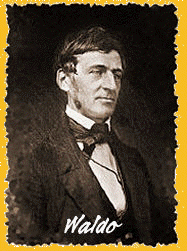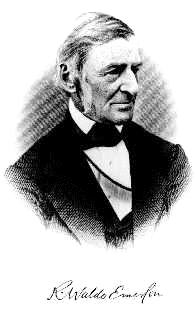RALPH WALDO EMERSON (1803-1882)CONCORD SAGE |
|---|
 |
To clothe the fiery thought
|
 |
|
“The poet is the sayer, the namer, and represents beauty. He is a sovereign, and stands on the centre. For the world is not painted or adorned, but is from the beginning beautiful; and God has not made some beautiful things, but Beauty is the creator of the universe. Therefore the poet is not any permissive potentate, but is emperor in his own right.” “The sign and credentials of the poet are that he announces that which no man foretold. He is the true and only doctor; he knows and tells; he is the only teller of news, for he was present and privy to the appearance which he describes. He is a beholder of ideas and an utterer of the necessary and causal. For we do not speak now of men of poetical talents, or of industry and skill in metre, but he of the true poet.” “All that we call sacred history attests that the birth of a poet is the principal event in chonology.” “The poet alone knows astronomy, chemistry, vegetation and animation, for he does not stop at these facts, but employs them as signs. He knows why the plain or meadow of space was strown with these flowers we call suns and moons and stars; why the great deep is adorned with animals, with men, and gods; for in every word he speaks he rides on them as the horses of thought.” The sage of Concord and the intellectual center of the American Renaissance--the flowering of our nation's thought in literature, poetry, painting, sculpture, architecture, and music in the period roughly designated from 1835-1880 that was concentrated in Boston and Concord, MA--Ralph Waldo Emerson, as preacher, philosopher, and poet, embodied the finest spirit and highest ideals of his age. A thinker of bold originality, his essays and lectures offer models of clarity, style, and thought, which made him a formidable presence in 19th century American life. Born on May 25, 1803, in Boston, Waldo, as he preferred to be called, received a classical education at Boston Latin School and at Harvard College. Following in his father's footsteps, Emerson was ordained a Unitarian minister in 1829, but he experienced a religious crisis after the death from tuberculosis of his first wife, the beautiful and romantic Ellen Tucker, to whom he had been married only eighteen months. Resigning from the Second Church and journeying to England in 1832, he became friends with Carlyle, Coleridge, and Wordsworth, and began to formulate his Transcendental faith. Returning to American in 1834, Emerson began a new career as a lecturer. The subsequent few years proved a roller-coaster of emotional events: the untimely deaths of his brothers Edward (1834) and Charles (1836); his remarriage to Lydia (whom he renamed Lidian because it had a more euphonious classical ring to it) Jackson of Plymouth and their settling comfortably in a new home in Concord, MA (1835); the birth of their children-- son Waldo in 1836, Ellen in 1838, Edith in 1841, and Edward in 1844; and the publication of Emerson's first major essay, NATURE (1836). Gathering around him a circle of poets, reformers, artists, and thinkers who helped define a new national identity for American art--among them, Henry David Thoreau, Nathaniel Hawthorne, Margaret Fuller, the Peabody sisters, the Alcott family, Jonas Very, the Ripleys and the Channings-- Emerson expounded his views on the mystical harmonies of man and nature, the essential perfectibility of the human spirit, the unity of the human soul with the divine Over-Soul, and the values of non-conformity, intellectual and spiritual independence, self-reliance, and utopian friendship. A committed Abolitionist, a champion of the hounded Native Americans, a tireless crusader for peace and social justice, a supporter of educational reform, as well as a selfless champion of other creative geniuses around him--(his letter endorsing Whitman's LEAVES OF GRASS hailed the younger poet as "the most extraordinary piece of wit and wisdom that America has yet contributed"), Emerson's writings combine passion with a purity of prose. With Margaret Fuller he founded THE DIAL, which published Transcendentalist literature from1840-1844, and in the years between 1837-1844 he published his most famous works, THE AMERICAN SCHOLAR, THE DIVINITY SCHOOL ADDRESS, and two volumes of ESSAYS (1841 & 1845), which contained the influential pieces SELF-RELIANCE, THE POET, FRIENDSHIP, and THE OVER-SOUL, this last an outline of the tenets of Transcendentalism. 1842 saw the death of his and Lidian's little Waldo, followed by the birth of their son Edward in 1844, and shortly afterwards in 1847 Emerson again went abroad, this time to England and to France, while Thoreau remained in Concord watching over the Emerson family. One by one throughout the remaining three and a half decades of his productive, disciplined life in which he lectured extensively and continued to write seven more major works, Emerson faced the departure of those close to him with stoic faith: his mother in 1853; his brother Bulkeley in 1859; his comrade Thoreau in 1862; his Aunt Mary Moody, who had been a profound influence on his moral and intellectual life from childhood, in 1863; his brother William in 1868. The last blow came in 1872, when the house where he and Lidian had lived for thirty-seven years burned. To relieve his depression, Emerson's friends arranged for him to travel abroad in 1873, while they raised the funds and oversaw the rebuilding of the house and the reconstruction of his library--a gift they presented to the speechless poet upon his return in 1873. There he lived quietly until his death into his seventy-ninth year, struggling with a waning memory, but persevering with his daughters' help, in editing his papers and publishing his last two volumes, PARNASSUS and LETTERS AND SOCIAL AIMS. On April 27, 1882, the great thinker died of pneumonia, caught some weeks before after a rain-soaked walk through his beloved Concord woods. The tiny New England town tolled the bell for each of his years, shrouded itself in black, and prepared for the onslaught of mourners who came from far and near to accompany Emerson to his rest on Poets' Knoll in Sleepy Hollow cemetery. |
|
|
Back to Concord Poetry Center Home Page |